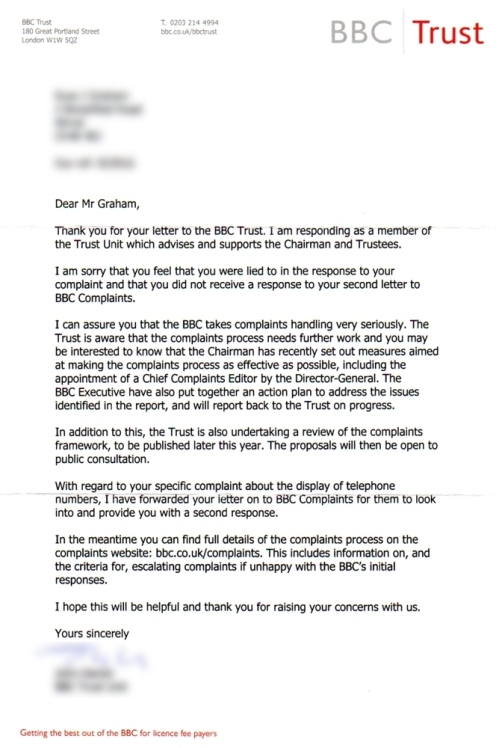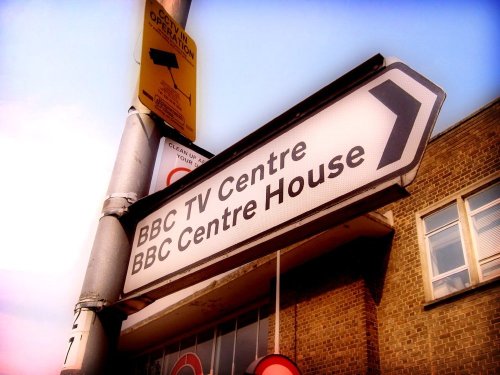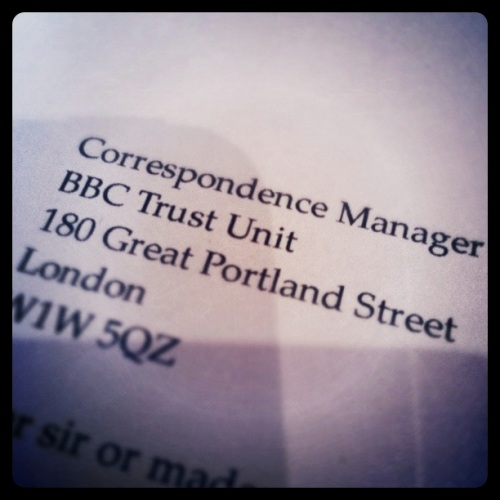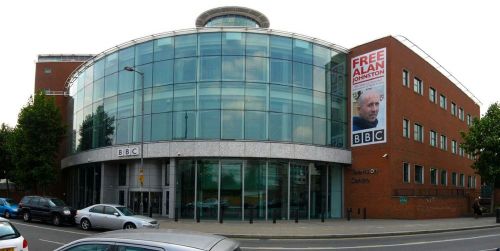I case you don't remember, a couple of months ago I took issue with the BBC over something very minor – the way they were displaying the telephone number for people wanting to take part in John Barrowman's godawful variety show. I know it sounds petty, but why show numbers wrongly when it's so easy to show them correctly?
bbc
I’m not upset that you lied to me, I’m upset that from now on I can’t believe you
A fortnight ago, I??escalated??a complaint from BBC Complaints to the BBC Trust??when BBC Complaints appeared to have told me a bare-faced lie. So far, no reply from them. But evidence has emerged that BBC Complaints do indeed, as I feared, lie to people who complain as a matter of routine.
Twitter is a social network platform which is available to most people who have a computer and therefore any content on it is not subject to the same copyright laws as it is already in the public domain.
BBC trust
Previously on 'Another Damn Blog': I wrote to the BBC to complain about a minor matter??of them getting telephone numbers deliberately wrong on-screen.
Arguing with the BBC
Oh, there's so little point in embarking on the course I have embarked upon, yet I have embarked upon it: the modern version of "go fight City Hall", "go argue with the BBC".
I'm a huge BBC fan. I have to say this, because there are a very tiny but extremely loud minority of sociopaths, right-wing loonsacks and general hard-of-thinking fools who believe the BBC is biased to the right/left/centre, is too/not enough progressive, sucks up/insults the government, is anti/pro war, and would be better if scrapped so that Mr Murdoch's empire could have free rein and save us from any or all of these supposed ills. I am not one of those fuckwits. Certainly not: I actually think that the licence fee is too little and should probably double (and then be index-linked to the Sky subscription price, as a counterweight). But there's no denying that the current BBC management are failing, dismally, to manage the BBC very well on a number of levels. Whose idea was it to sack experienced, dedicated people in London in order to hire cheaper people in Salford? Whose idea was it that BBC-2 should be rudderless and seemingly without a reason to be? Whose idea was it to sell Television Centre like this was still 1994? Whose idea was it to cave in to everything and more a pro-Murdoch, anti-BBC government wanted without a fight? This lack of management has begun to filter down through the ranks. With nobody leading at the top, the middle management has got confused and the bottom management is operating without support, so much so that I've had reason to complain to the BBC twice in the last couple of months – and I almost never complain to the BBC, mainly because it's an exercise in futility, but also because, as I say, I'm a huge BBC fan. I've previously detailed how I complained to the BBC over a trivial – oh, go on then, anal – matter of them putting on-screen, at prime time, on BBC-1, wrong phone numbers. The promo makers – possibly Red Bee Media in these outsourced days, I don't know – grouped a London number as 0208 576 9785, when the code for London is 020 and the number therefore is 020 8576 9785. Anybody in London who doesn't know that 020 is the code would dial 576 9785 and wait for about 45 seconds before the schoolmistress BT voice broke in to tell them to check the number and dial again you idiot. I hoped that the BBC would accept this point and say that they'd try to get the numbers right in future. My mistake: they justified it instead. After careful research, the BBC has found that grouping numbers in "easy to remember" clusters is now policy. Of course, I had to get back to them (they make you go back to the website, jump through all the hurdles again and write your reply in a tiny box, possibly just for the lulz) and, tactfully or otherwise, call their bluff. If there has been research into such a preposterous subject, then please can they produce it, I asked. So they ignored me. Needless to say, I've put in a Freedom of Information request to attempt to unlock this research they claim to have done. I'm awaiting a reply, but if (when) that produces the reply "we can find no record of such research", then the next step is to take it to the BBC Trust: not because of the damn telephone numbers, but because the BBC, like everybody else, doesn't have carte blanche to lie to people when they can't find an actual justification for what they're doing. Who do BBC Complaints think they are, politicians? I was typing my FoI request while listening to BBC Radio 4's six o'clock news. Three quarters of the way through, their science correspondent came on with a package about exciting research done by the charity Diabetes UK that offered real hope for a cure for diabetes. Several paragraphs of about the detailed "scientific study" were read out before, in a classic "Paragraph 19 denial", the correspondent added that the "study" was of 11 people. Eleven people? Nothing scientific, nothing statistically significant, nothing of note at all can come from a study of 11 people. A beat later and he 'fessed up that, of those 11, only 7 had had a medium-term improvement in their condition. He then added a brief disclaimer hinting that the science wasn't up to much and the package ended. In short, the man had come on the radio and read out Diabetes UK's press release. I complained out loud Twitter and then directly to BBC Complaints – again in full knowledge that doing so will be futile and, on past evidence, knowing that they'll tell easy lies to make me go away. Interestingly, Diabetes UK saw my Twitter complaint. They were at pains to point out that they did think the research was important… but also that an 11 person study wasn't up to much and that they needed to ensure scientific rigour was evident in future; but particularly that my concern was valid and they hoped that the BBC would listen, which suggests a lot of things about that particular report, none of them flattering to the BBC. I await the reply from the BBC, even if it is just fobbing me off as I expect, with real interest – and will report back.0208 if you’re outside reality
Some will say this is petty, but it’s worth pointing out.
Just before Doctor Who, the BBC ran a trailer for the return of the John Barrowman cheap variety filler programme “Tonight’s The Night”. They were begging for idiots in the audience to apply to humiliate themselves on television. In order to take part in this ritual humiliation, they need to call the production company.
Just call 0208 576 9785, they said. Except this number doesn’t exist. The Subscriber Trunk Dialling number for London is 020. It used to be 01, as we probably all remember from childhood when the BBC would often tell viewers “Call for more information on 01, if you’re outside London, 811 8181”, helpfully ignoring that 85% of the country are outside London. Then they split London into inner 0171 and outer 0181. Then they combined both again into 020. When they created 020, they added 7 or 8 to the front of the local number to make more numbers. Since then, they’ve introduced 3 at the start of the number for some subscribers, with 5 to follow soon.
Similar changes of numbers have happened elsewhere too. Leeds was 0532 (0LE2 on the old dials, see?) but they changed it to 0113 and put an extra 2 on the front of the subscriber number. So a Leeds number is 0113 2XX XXXX. It isn’t 01132 XXXXXX. Locally, you have to dial the 2, even if you don’t have to dial the 0113.
So when the BBC said to call 0208 576 9785, they meant 020 8576 9785. Why is this important? Because these little things are important. If the BBC can’t even research correct telephone numbers for a trailer, why should we expect them to research correct background information for a news report?
If the BBC can get its own telephone number wrong, can they be trusted to make a documentary without cutting such basic corners? If there’s a phone vote, can they be trusted to count the calls correctly? If they can’t even get a phone number right, can anything they say be trusted? From such acorns do mighty oaks grow.
A perfect day
I am a huge supporter of the BBC. It is a fundamental part of our culture, something that unites what can often be a fractious and unhappy nation. It makes the best radio (via Radio 4) and the least worst television in the world. Without the BBC, and the unique way it is owned and funded by us all, Britain would be unbearable.
Alas, the one thing the BBC has been incapable of doing of late is reminding us all of that – just at the time it is under the greatest attack, from a fearfully right-wing government and their friends in the big media companies. The last time the BBC was hammered in this way, it responded with real style. Under the dreadful John Birt, the Corporation continually reminded viewers and listeners of how great the BBC was.
Now, the BBC is a wounded beast, seeking to hide from the aggressors and failing to even do the minimum needed to defend itself. It is seriously in danger of being broken up and privatized – as is the NHS – on the basis that doing so worked so very well on British Rail 15 years ago. BR didn’t stand up for itself particularly well (although it did the very best it could to ensure that the Board’s staff didn’t get the shitty end of the stick as much as the government wanted, thereby doing a very good job as an employer even as the Board carefully packed BR away). The NHS has us all standing up for it, including the nurses who have finally got rich twat Andrew Lansley to kneel before them (it won’t work, he’s still going to screw the NHS, and us, over).
The BBC doesn’t even have the BBC standing up for the BBC. Instead we’ve all had to do it, and we’re all eminently ignorable by this terrible government.
So it’s nice to see a small fight-back. During the coverage of some wedding or other on TV today, they aired the above video. Neatly done, a nice reminder of the BBC’s strengths, right in the middle of a top-rated broadcast. Well done!
Of course, it’s not as good as the best ensemble promo ever done (in fact, the best promo ever done, I suspect) but then it’s hard to live up to the standard that “A Perfect Day” set.



